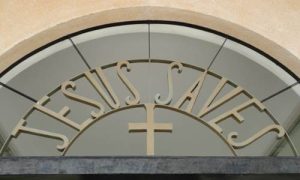GOD’S MERCIFUL INTERVENTION IN MY LIFE
Samuel Joseph
A Testimony at the Church Prayer Meeting, Friday night, 8 August 2014

I have been away from Singapore for quite a few years, so I wanted to share my experiences overseas and how God has been so gracious to me.
The truth is that I was backsliding for many years, and once I was away from the spiritual support of my home in Singapore it only became worse. In Genesis 13:12b we read that “… Lot dwelled in the cities of the plain, and pitched his tent toward Sodom”. Similarly for me, though in my head I had all the knowledge of the Bible I had learned from Sunday services and Bible studies, my heart was inclined toward the world. Though I didn’t engage publicly in many overtly worldly practices, privately I allowed things to take root in my heart. Hebrews 3:13 speaks of the “deceitfulness of sin”, and this has been my experience—once sinful desires took hold, they subverted even my will to act against them, and over time they became almost cherished habits.
I thank God that He did not leave me in this state. He intervened, mercifully. It is difficult to describe exactly what happened, but I was very suddenly and strongly faced with the certainty of a life of misery outside of Christ. I was broken down, and my heart which had become so hardened was softened by God’s grace. I thank God for my parents, and for all of you who were praying for me. I thank God for providing a faithful church in London, only a few minutes’ walk from where I was staying.
But the struggle against sin and worldliness is far from over. Many times in Scripture the Christian life is described in terms of a battle, and this is such an apt description – although by God’s grace we are not alone in the fight. I mentioned Hebrews 3:13 earlier, and the verse in full reads, “But exhort one another daily, while it is called To day; lest any of you be hardened through the deceitfulness of sin.” So I thank God for exhortation from the faithful brothers and sisters in this congregation and in London. Please continue to pray for me, that I will not become entangled again in my old sinful ways, and that I will not allow the world to draw me away from my Saviour.
1 Peter 5:10-11 says, “But the God of all grace, who hath called us into his eternal glory by Christ Jesus, after that ye have suffered a while, make you perfect, stablish, strengthen, settle you. To him be glory and dominion for ever and ever. Amen.”
FAR EASTERN BIBLE COLLEGE

This semester (Jul-Nov 2014), the College has a total enrolment of 467 students: 77 day students (fulltime: 45, part-time 32), 220 “Basic Theology for Everyone” (night class) students, and 170 distance learning students. The students come from 13 countries: Australia, Cambodia, China, India, Indonesia, Korea, Kenya, Malaysia, Myanmar, New Zealand, the Philippines, Singapore, and Thailand.
Early this semester saw the College directors attending State Court hearings due to Life BPC’s suit against FEBC which was filed in June 2013. This was Life BPC’s second lawsuit against FEBC. Their first which sought to evict FEBC failed. In that suit, the Court of Appeal on 26 April 2011 ruled in favour of FEBC stating in no uncertain terms that FEBC has the right to occupy and use the premises at 9, 9A & 10 Gilstead Road. FEBC is protected by the law of charitable purpose trusts. This is in keeping with the biblical injunction, “Remove not the old landmark; and enter not into the fields of the fatherless: For their redeemer is mighty; he shall plead their cause with thee.” (Prov 23:10-11). We now wait for the Scheme with regard to the allocation and sharing of the properties to be finally established and implemented.
Now, Life BPC’s second lawsuit was for money. (For context, see article “In the Interests of the Church” in the 11 August 2013 Weekly.) They claim that FEBC owed them $250,000 for utilities and maintenance from 1970 to 2008. The trial was held in the State Courts on 24 and 25 July 2014. On the second day of the public trial, Life BPC’s lawyer indicated in open court that his clients would now like to explore the possibility of an amicable settlement.
Life BPC should not have sued in the first place. There was no legal basis for their claim against FEBC. More importantly, it is against the command of Scripture to take a fellow believer to court for money (1 Cor 6). They know this. They ought to know that in this case it is not anybody’s money but God’s money. We had discouraged them from suing and out of Christian charity had sought to resolve this matter amicably, but they kept rejecting our goodwill. “Heaven has eyes.” There is a God who knows and sees all, “And he shall judge the world in righteousness, he shall minister judgment to the people in uprightness. The LORD also will be a refuge for the oppressed, a refuge in times of trouble. And they that know thy name will put their trust in thee: for thou, LORD, hast not forsaken them that seek thee.” (Ps 9:8-10).
The Lord knows the needs of His servants—His School of Prophets—the FEBC. As announced in the August 3rd Weekly, we are thankful for the space allotted to us at 9, 9A & 10 Gilstead Road by the High Court Judge. Pray for the Scheme to be protective of FEBC’s freedom and space for our offices, classrooms, central library, dormitories, family quarters, kitchen, storerooms, dining, music, recreation rooms etc. We need the space to grow. We have suffered too long already. The old buildings at 9A Gilstead Road will need repairs and renovation. We are thankful for the love gifts that are coming in for this purpose.
FEBC is worthy of help and support. In these last days of apostasy, FEBC is one of the rare schools which teach and defend the historic Reformed Faith and the perfect preservation of God’s inspired, infallible and inerrant words in the original languages (VPI/VPP). Our beloved founding Principal, the late Rev Dr Timothy Tow, said it well, “The Bible is 100% perfect without any mistake.” “The words of the LORD are pure words: as silver tried in a furnace of earth, purified seven times. Thou shalt keep them, O LORD, thou shalt preserve them from this generation for ever.” (Ps 12:6-7). The Lord bless those who bless FEBC. JK
THE DIRECTIONS TOWARD APOSTASY
Kent Brandenburg
Often I use google maps for directions. Their maps are even better now. I have GPS in the car, but GPS doesn’t show the whole route, and I like to see that path that google draws between destinations. For instance, today my son is driving between Fort Sill and Fort Carson, so I googled (blogger, owned by Google, says googled is spelled wrong – it’s not a word yet) Lawton, OK and then the map of Lawton popped up. I typed in Fort Carson and saw that it was 8 hours and 51 minutes for him to get there. There is one part that is about 200 miles and another about 300. Google lists the various parts and the turns and will even show separate maps for it. I could see how he gets there.
How does one get from Bible believing Christianity to apostasy? Like on “list steps” with google maps, I’m going to list the most obvious steps, as I see them. The point, of course, would be not to get there.
If I were to characterize the three major stops on the road of apostasy, I would call the whole road, “faithless.” Each of these steps takes away confidence that should be there. You can’t turn an actual saved person apostate, so this attack on faith relates to people not getting a genuine faith. It produces stony, thorny, and then hard ground. However, it very easily gives people a replacement, impostor faith. Many think they are saved, but they are not. And the trek, the map toward apostasy, lists these major roadways with turns to each. They also come in this order.
Step One: Lack of Confidence in What the Words of God Are
Before I get into describing this one, some might think a better explanation is a denial of the Word of God, questioning its inspiration and authority. Men do that, but I don’t see this to be the first step in the road map as I see it. That is less subtle and surely people question that, but this is not the path that apostasy is taking. Men start with not being sure what the Words of God are. This, of course, does take away from the confidence in the authority of scripture.
Even though scripture promises perfect preservation of every word of scripture, accessible to every generation of Christians, this is denied by this almost entire generation of evangelicalism and fundamentalism, contrary to the biblical and historical position. Therefore, most professing Christians are not sure about every word. They don’t know. Generally, they are told lies about this. They are told that all the words are somewhere in the preponderance of the manuscripts. Evangelicals and many fundamentalists don’t believe that, even though they say it is their position. Then they say that the biblical position is a heterodox and heretical doctrine, which is an abominable lie, especially since it is their position that is novel and contradictory to scripture. They in general don’t tell their people that they don’t know what the words of scripture are, even though they don’t believe they know or even can know. I think they are afraid of telling their people that bit of news, seeing that they themselves imagine how that tends toward apostasy.
The fall back position for many is that the percentage of variation doesn’t change doctrine, and then you find they mean that it doesn’t change any major doctrine. In fact, the differences change the meaning of scripture, including what the Bible says about its own preservation. Questions arise, such as, if God could inspire a perfect scripture, why couldn’t He keep it for us, especially when He promised He would? And this question has motivated a new concept of inerrancy. The attention turns back on the so-called original manuscripts, which, of course, they don’t believe we have.
Here’s how this point works with apostasy. If we can’t know what the words are, then how can we know what they mean or how they apply? How can we expect people to obey them, when we are still arguing about what they are? When there is so much diversity on what the Bible is, how can we expect people to understand what the Bible means? If we are to live by every word, but we don’t have every word, then we have to allow for some disobedience. And if man concocted rules provide the strongest basis for what the words are, how can the Bible be a supernatural book? If knowing which are the words is optional, shouldn’t some obedience be optional? The uncertainty is doubt and doubt doesn’t engender faith.
[For Steps Two and Three, the reader is encouraged to go to Dr Kent Brandenburg’s website—WHAT IS TRUTH—at http://kentbrandenburg.blogspot.sg, sv Tuesday, August 5, 2014. He is the General Editor of the book, Thou Shalt Keep Them: A Biblical Theology of the Perfect Preservation of Scripture (315 pp). The book is available at the FEBC Bookroom.]


